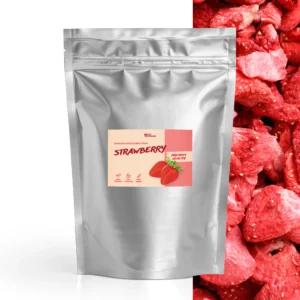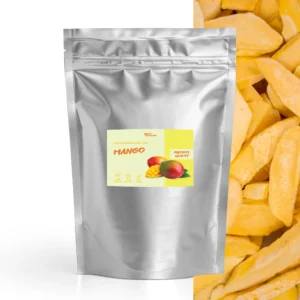Vitamin C, also known as ascorbic acid, is an essential nutrient for the proper function of the human body. It plays a vital role in various physiological processes and is involved in the growth, development as well as repair of body tissues. As our body is constantly repairing, regenerating and detoxifying, it is essential to replenish it daily with building substances (proteins, fats, carbohydrates) and also with protective substances, including vitamin C. Vitamin C cannot be produced by the body on its own, so it must be included in the diet.
Where is vitamin C found in natural sources?
Vitamin C is abundantly found in many fruits and vegetables. Some excellent natural sources of vitamin C include citrus fruits (such as oranges, lemons and grapefruits), strawberries, kiwi, pineapple, mango, tomatoes, red and green peppers, broccoli, spinach and kale. Even the skins of potatoes contain a lot of vitamin C, so when preparing vegetables, prefer to prepare them with the skins on (if possible) and avoid long boiling, roasting and baking. The quicker and lower the temperature at which you prepare vegetables and fruit, the more vitamin C you will preserve.
Daily intake of vitamin C
The recommended daily intake of vitamin C varies depending on age, sex and life stage. For adults, the recommended daily intake is generally around 75-90 milligrams (mg) for women and 90 mg for men. However, certain conditions, such as pregnancy, breastfeeding, smoking, and certain diseases, can increase the need for vitamin C. Here are some examples of fruits and vegetables and their approximate vitamin C content:
Orange (1 medium): about 70 mg of vitamin C.
Red pepper (1 medium): Approximately 150 mg of vitamin C.
Kiwi (1 medium): Approximately 70 mg of vitamin C.
Strawberries (1 cup): Approximately 85 mg of vitamin C.
Broccoli (1 cup, cooked): Approximately 80 mg of vitamin C.
When is it a good idea to supplement vitamin C?
There are several circumstances in which it may be beneficial to supplement vitamin C in supplements. Here are some common situations where vitamin C supplementation may be considered:
Limited access to fresh fruit and vegetables: if you have limited access to fresh fruit and vegetables due to factors such as geographical location, lifestyle restrictions or dietary restrictions, vitamin C supplementation can help ensure adequate intake.
Low intake of vitamin C-rich foods: If your diet consistently lacks vitamin C-rich foods, such as fruits and vegetables, due to personal preferences, dietary restrictions or special diets, vitamin C supplementation may be appropriate for you.
Increased vitamin C requirements: Certain conditions or situations may increase your vitamin C requirements. These include pregnancy and breastfeeding, which require higher levels of vitamin C for fetal development and milk production. Smokers may also benefit from extra vitamin C, as smoking increases oxidative stress and depletes vitamin C levels.
Chronic diseases or medical conditions: Certain chronic diseases, such as absorption disorders, indigestion, and some cancers, may interfere with the absorption or utilization of vitamin C. In such cases, supplementation may be recommended to ensure adequate levels of this essential vitamin C.
Recovering from illness or surgery: during illness, injury or after surgery, the body's need for vitamin C may increase due to the increased demands of the immune system and tissue repair processes. Supplementing vitamin C during these periods can promote recovery and aid in wound healing.
It is important to note that while vitamin C supplementation may be beneficial in these circumstances, it is always best to consult with your treating physician who can assess your specific needs and provide personalized recommendations. He or she can consider your overall health, dietary habits, and any potential interactions with medications or existing medical conditions to determine the appropriate dosage and duration of vitamin C supplementation for you.
In what form is vitamin C supplementation ideal?
Vitamin C supplements are available in a variety of forms, and the choice of form depends on individual preferences and needs. Here are some common forms of vitamin C supplementation:
Ascorbic acid: This is the most common and widely available form of vitamin C supplement. Ascorbic acid is pure vitamin C and is often available in powder, tablet or capsule form. It is usually affordable and easily absorbed by the body.
Liposomal vitamin C: Liposomal vitamin C supplements are better absorbed and utilized by the body when combined with fat. However, this alternative is more expensive and less affordable for people.
Vitamin C from food: Some supplements are derived from whole foods, such as acerola cherry or camu camu, which naturally contain high levels of vitamin C. These supplements can provide additional phytonutrients and antioxidants found in whole food sources.
Possible medical contraindications
Vitamin C is generally considered safe when consumed within recommended dietary limits. Excessive intake of vitamin C from supplements (usually more than 2,000 mg per day) can lead to gastrointestinal upset such as diarrhea, nausea, and stomach cramps. Patients with kidney stones should be cautious because supplementation with high doses of vitamin C may increase the risk of kidney stone formation.
Drug interactions: Supplementation with high doses of vitamin C may interact with certain medications, including blood thinners (such as warfarin) and some cancer treatments. If you are taking any medications, it is important to check with your healthcare provider before starting any vitamin C supplements.
Remember that in general, it is best to get nutrients, including vitamin C, from a well-balanced diet that includes a variety of fruits and vegetables. If you have specific concerns or conditions that may require vitamin C supplementation, it is advisable to consult a healthcare professional for personalised advice.
Do you like crisps and love fruit at the same time? Try reaching for our quality freeze-dried fruit in a variety of flavours, which contain sufficient amounts of the aforementioned vitamin C.





